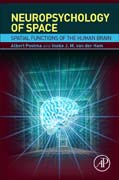
The Neuropsychology of Space: Spatial Functions of the Human Brain
Postma, Albert
van der Ham, Ineke J. M.
The Neuropsychology of Space: Spatial Functions of the Human Brain summarizes recent research findings related to understanding the brain mechanisms involved in spatial reasoning, factors that adversely impact spatial reasoning, and the clinical implications of rehabilitating people who have experienced trauma affecting spatial reasoning. This book will appeal to cognitive psychologists, neuropsychologists, and clinical psychologists. Spatial information processing is central to many aspects of cognitive psychology including perception, attention, motor action, memory, reasoning, and communication. Any behavioural task involves mentally computing spaces, mechanics, and timing and many mental tasks may require thinking about these aspects as well (e.g. imaging the route to a destination). Discusses how spatial processing is central to perception, attention, memory, reasoning, and communicationIdentifies the brain architecture and processes involved in spatial processingDescribes theories of spatial processing and how empirical evidence support or refute theoriesIncludes case studies of neuropsychological disorders to better illustrate theoretical conceptsProvides an applied perspective of how spatial perception acts in the real worldContains rehabilitation possibilities for spatial function loss INDICE: 1: Basic Space 2: Space and the senses 3: Body space and touch 4: Action Space 5: Spatial attention 6: Visual space perception 7: Space and language 8: Spatial Memory 9: Navigation 10: Space in clinical practice
- ISBN: 978-0-12-801638-1
- Editorial: Academic Press
- Encuadernacion: Rústica
- Páginas: 460
- Fecha Publicación: 01/09/2016
- Nº Volúmenes: 1
- Idioma: Inglés
